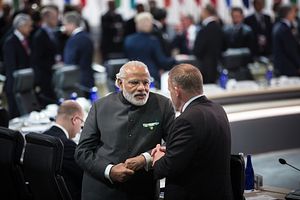It’s going right down to the wire and Indian diplomacy has never looked more self-assured and confident. New Delhi is openly taking on China in a manner few states have dared in recent times. By so doing it is laying down new terms for global politics and setting new parameters for Indian foreign policy. India may or may not get a seat at the Nuclear Suppliers Group (NSG) this week, but Indian diplomacy will never be the same again.
Indian Foreign Secretary S Jaishankar is in Seoul, South Korea, to attend NSG’s plenary meeting scheduled for tomorrow and Indian Prime Minister Narendra Modi will meet Chinese President Xi Jinping on the sidelines of the Shanghai Cooperation Organization (SCO) summit in Tashkent to make one final effort to change China’s stand on India’s entry into the NSG. India’s entry into the 48-member Nuclear Suppliers Group (NSG), whose members can trade in and export nuclear technology, has emerged as the latest battleground in the growing Sino-Indian contest.
Where the United States and other supporting members have called for India’s inclusion based on New Delhi’s non-proliferation track record and the U.S.-India civil nuclear accord, China has made the NPT signature (or lack thereof) its central argument to scuttle India’s entry. Beijing has claimed that a “compulsory” requirement for NSG membership is that “the NSG members must be signatories to the NPT.” Apart from the rhetoric about the NPT, China has also encouraged Pakistan to apply for NSG membership so as to link New Delhi’s entry with that of Islamabad’s, knowing well that there will be few takers for Pakistan’s case.
After consistently refusing to entertain India’s case over the last few weeks, Beijing has indicated that it will “play a constructive role in the discussions on India’s NSG membership.” Taking a swipe at the United States, Beijing has argued that “the U.S. is one of those who made the rule that non-NPT countries should not join the Nuclear Suppliers Group.” Pakistan, meanwhile, has already claimed that it has “successfully” blocked India’s bid to gain membership of the NSG. The United States struck back by revealing that entities of the Pakistan Atomic Energy Commission (PAEC) have been continuing to supply restricted items and equipment with a direct bearing on the production of nuclear weapons to North Korea in violation of UN sanctions. China has tried to keep this information secret so that it doesn’t jeopardize Pakistan’s NSG bid. All to ensure that India does not get entry into the NSG!
Indian diplomats, meanwhile, can claim credit for setting the contours of great powers politics today even as they pursue Indian interests with a singular clarity. This is a tribute to the Modi government’s deft handling of foreign affairs. It has managed to energize a risk-averse and ossified bureaucracy—a bureaucracy that goes into spasms of hyperventilation just hearing the term “lateral entry.” India’s foreign policy bureaucracy is today realizing that a new form of “lateral entry” has forced it to shape up and that’s the entry of Modi and his foreign policy team. Modi’s style of foreign policy has been so disruptive that a new paradigm of foreign policy is being created that will have long term implications for the country. Those who criticize Modi for only bringing in a new style of Indian diplomacy with no substantive change should now recognize that stylistic changes in foreign policy have their own logic, eventually leading to new conceptualizations of state power.
As India’s dynamic diplomacy on the NSG issue underscores, Modi’s style is already having a significant impact and will gradually end up overturning the long-held shibboleths of Indian foreign policy. If India succeeds in gaining entry into the NSG, it will be a feather in the cap of the Modi government. If it fails due to China’s obstinacy, it will reveal to the world and the Indian people that China has no intention of accommodating Indian aspirations to great power status. For India’s traditionally conservative foreign policy establishment, this is not a particularly bad place to be in. India is finally proactively shaping global outcomes, not merely reacting to the actions of the others.

































